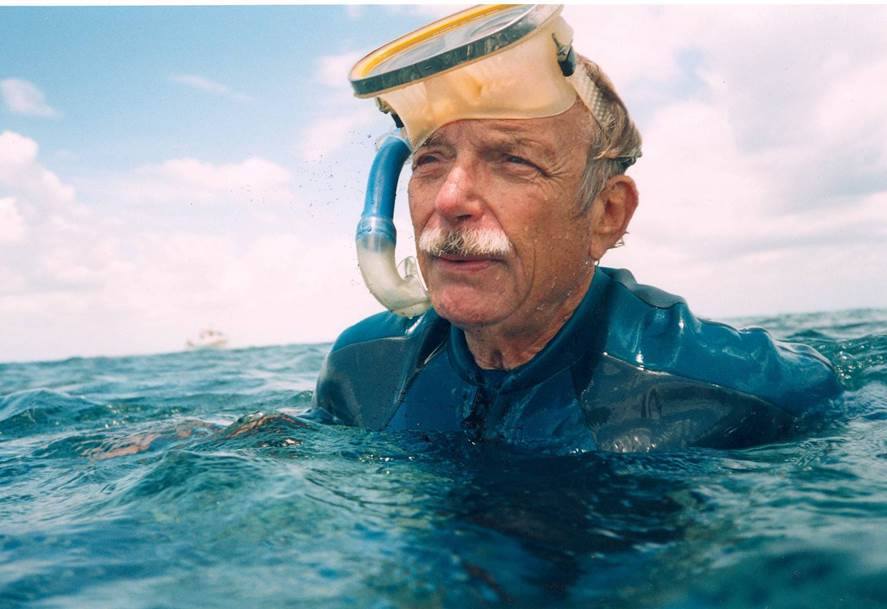We are deeply saddened by the passing of former professor Robert Ginsburg, University of Miami’s Rosenstiel School Department of Marine Geosciences
Robert Nathan Ginsburg (1925-2017) was a geologist who studied carbonate sediments, their genesis, deposition, and transformation into mature rocks. He defined the profession of carbonate sedimentology and was one of the most influential thinkers in his field working in both industry and academia, retiring at the age of 85. His career began in 1950 when he left the University of Chicago to become a research assistant at the University of Miami’s Marine Laboratory, the precursor of the present Rosenstiel School of Marine and Atmospheric Science (RSMAS). Subsequently he moved first to establish and lead a research and training program on carbonates for the Shell Development Company in Coral Gables (1954–65), then to become Professor of Geology and Oceanography at The Johns Hopkins University (1965–70). In 1970, he was persuaded by Cesare Emiliani to come back to the University of Miami as Professor of Sedimentology. At that time, he organized the T. Wayland Vaughan Laboratory for Comparative Sedimentology headquartered on ocean-facing Fisher Island at the entrance to the Port of Miami. In 1991, the University sold Fisher Island and Bob moved fulltime to the RSMAS campus. At the Rosestiel School, he continued to develop and pursue new avenues, exchanging his role as head of the Sedimentology Laboratory for an effort to spear head the assessment of declining coral reefs in the Caribbean. In this new direction, he touched an entire new generation of scientists.
His first published paper appeared soon after his arrival in Miami, ‘Intertidal Erosion on the Florida Keys’ (1953). It was a harbinger of his future career as it questioned the prevailing chemical explanation for shoreline erosion by offering a biological alternative. In the following half century, with his associates, post-doctoral fellows and students he has authored a series of seminal papers, books and reports on the links between contemporary and Holocene processes and products of carbonate deposition and their fossil counterparts. These publications have ranged from the formation of dolomite, precipitation of cements in reefs, health of coral reefs, sedimentation and history of carbonate platforms, and stromatolites. These studies, combined with countless field trips and lecture tours in North America, Europe, North Africa and Australia, have had a significant worldwide influence on research, teaching and the petroleum potential of carbonate deposits. A measure of this impact is the award of Fellowship in the American Association for the Advancement of Science and the Geological Society of America, the Twenhofel Medal of the Society for Sedimentary Geology, the Sorby Medal of the International Association of Sedimentology and honorary membership in four professional societies.Gins
While his impact on his profession has been immeasurable, he has also been an inspiring teacher and the principal advisor for more than 20 graduate students as well as numerous post-doctoral associates. While some of his students and post-doctoral associates stayed at home in Miami, others have become distinguished teachers and geologists throughout the world. It would almost be understated to say that Bob Ginsburg’s influence upon the study of carbonate environments has been immeasurable.
Bob is survived by his long-term friend Leonore Bernard as well as numerous friends, associates, and former students.
Memorial service will be on Sunday, July 16 at 10:30am at Riverside Gordon Memorail Chapel, 5900 SW 77th Avenue Miami, Florida 3314.
Gifts can be made in Dr. Ginsburg’s memory to the Ocean Research and Education Foundation, or to the Marine Geosciences Department at UM Rosenstiel School, Attn: Advancement, 4600 Rickenbacker Causeway, Miami FL 33149
Above: Image Courtesy University of Miami’s Rosenstiel School of Marine & Atmospheric Science | Facebook






